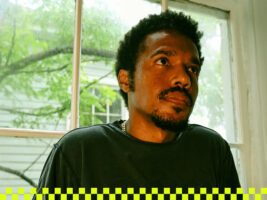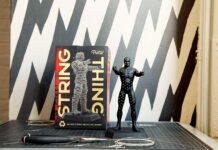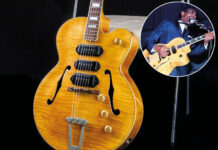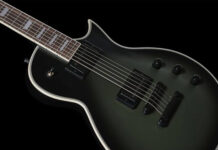
“I didn’t want Bob Dylan to sue me!” How Benjamin Booker transcends classic punk, blues, and soul on new album Lower
It’s been a stretch between albums for New Orleans-based, Tampa Bay-raised Benjamin Booker. His third album, Lower, marks eight years since Witness and the first album he’s released on his own label Fire Next Time Records. Most of the album was completed while Booker was living in the Australian town of Fremantle in Perth, West Australia, via trading emails with his LA-based co-producer.
READ MORE: Why Better Lovers are 2024’s most exciting hardcore band – and are poised to take over in 2025
The unflinching, dark heart of Witness (featuring Mavis Staples on the title track) evoked stories of racially-targeted shootings, murder of Black and brown people without consequences for the perpetrator, and an inherently systematic racism in everyday life to this day. Rich, sadly soulful gospel beauty defined Witness which yearned for solidarity and unity.
It was a cross-genre leap, three years on, from Booker’s self-titled 2014 debut which thrilled in its distorted, bluesy punk riffage. Both albums orbit around Booker’s guitar lines – whether acoustic, unpolished and heartfelt, or nostalgic blues and soul, or snarly, untamed rock’n’roll.
And both, fundamentally, centre the role of bearing witness: to history, to the present, and for generations, communities and individuals for the decades and centuries to come. Lower is a different prospect to Booker’s first two albums, inevitably, but it still bears witness. This time, to Booker’s inner mental landscape: a moody, restless loner who craves a sense of peace.
He has teamed up with past collaborator, the renowned LA-based hip-hop producer and DJ Kenny Segal (aka Syndakit). Segal’s 2023 album with Billy Woods, Maps, featured guests Booker and ELUCID on Baby Steps: an atmospheric, woozy rap track. For an artist steeped in garage-blues-punk rock who has previously cited The Gun Club and Blind Willie Johnson as influences, Booker has defied a narrow path from his musical heroes to his own creations.
Same But Different
Booker resists any notion that his albums are vastly different, either in subject or sound.
“I listened to them back-to-back at some point when I finished all three of them, and they didn’t sound too dissimilar to me. I mean, they’re just like pop songs, but with distortion. Subject-wise, there’s not a huge difference between them, really, either. I think, with this album, it was more of a stylistic change in the process of how I was making the album, but, but when I actually listened to the different sounds and things, it doesn’t seem like I’ve changed very much, you know?”
A dizzying, diffused, and distorted harmony of electric guitar kicks in on the opening track Black Opps, underlaid with a throbbing synth drum beat. It’s murky, sexy, and determined to hook you from the opening seconds. LWA In The Trailer Park, likewise, thrills in a cloak of fuzzy, grizzled electric blues covering a slow trap-beat heart.
If you were to geolocate Booker’s sound on Lower, it would be precisely where a 1970s-era sticky carpeted Los Angeles recording studio meets a glammed up, tech-loaded, late noughties hip hop studio. It makes sense, since Booker’s lyrics hark to history, US cultural legacy, while placing his audience directly in the present: “going deeper”, as he sings, “into the fallout”.
Hauntingly, Same Kind of Lonely has a sad, hopeful plea: “I’m looking for the real thing…” that lulls the listener into a trance before the sharp, barking sound of gunfire bursts through along with screams and random voices. It was sampled from the video of a school shooting. Booker contrasts this nightmare with the sweet sound of his daughter laughing. This is America, indeed.
Things ended, not entirely amicably according to online buzz, between Booker and his past record label after the contracted first two albums. His former label’s non-existent appetite for an experimental approach to both recording and the music itself meant that by the time Witness dropped, both parties were walking away from the table. The Fire Next Time was a convenient name for Booker’s newly founded label, the same title he’d given his own business in his early days post-college – named after a 1963 James Baldwin book.
The name for the label isn’t so exciting, he concedes, but Lower was initially intended to be named something more inventive.
“I really wanted to call it The Highest I’ve Ever Been Was At A Bob Dylan Concert,” Booker admits, “But I was told that legally I’d have a nightmare of a time trying to do that. It’s named Lower because I didn’t want Bob Dylan to sue me.”
Benjamin Booker likes to meander, observe, and hone in on the minute details and nuances: musically, of course, but it is hardwired into his existence. Having already waited over 5 years since his previous album, he felt no pressure to deliver an album to someone else’s deadline, nor to appease external expectations on how it would be made, nor how it would sound.
Lower Down Under
Lower, accordingly, took nearly two years to make, and Booker worked from an old theatre in Fremantle, Victoria Hall.
“The only time we got in the studio together was for four days at the end of two years of trading emails,” Booker says.
“There was very little talking between us. I think there was just like a general vision, because in the beginning we had talked about what we wanted to do. And there was just a lot of trust, really, between us. The big thing, the overriding thing, was to look at ambient and electronic music and rap and hip hop and singer songwriter music, and to try to incorporate all of those elements in one song, but to not lean a certain way.
“So, if we had a song that was too heavy on guitar, it was like, ‘well, let’s sample the guitar and chop it up so that it’s less rock specific.’ Or if it’s very heavy on bass and drums, it’s like, ‘well, let’s bring in more guitar’. I think that we had an understanding of just trying to get to something that felt specifically like us, and felt exciting to us, and not like something that we had heard before.”
He adds, “The fun part about making music is having an idea in mind, but not knowing how to get there, and going into the studio and trying it out. We had a lot of time to make this album, because nobody was asking me for albums.”
It skilfully warps guitar sounds, hip hop-style rhythm sections and percussion, clever and considered lyrics, and Booker’s breathy, lamenting croon.
Direct Intention
To achieve a textural, atmospheric ambience, albeit with the groove of a strong drum beat, Booker met with a handful of indie producers but things really clicked when he explained his vision to Kenny Segal. The renowned hip hop producer, who works from his own LA studio, got it. One of the earliest singles, and a personal favourite of Booker, Slow Dance In A Gay Bar, reflected the moody, fuzzy and distorted guitar-meets-slow trap beats, capital-letter Big Feelings, the duo were talking about. It was the only track that did not get endlessly tweaked, revised, and reshaped over a year and a half.
The guitar was recorded directly into the computer, rather than live, then warped and shifted into various sculptures of sound. It wheedles, it groans, it chugs, it worms around a bassline with sinuous, malevolent beauty. It is alive.
“One of the things I was trying to do is to make the guitar less of an instrument on this album, and to provide more atmosphere, I guess. I’ve never been somebody who’s really interested in noodling or riff-heavy music in general. So, I was just looking to ambient people. I remember listening to Tim Hecker a bunch, to this group from the UK called Space Afrika, and to William Basinski’s Disintegration Loops, and to this shoegazer band from Chicago called loveliescrushing. It was these different ways, and these textures that stood out to me, and that I thought I could kind of try to recreate on my guitar.”
Booker was using an early 1960s Epiphone Olympic, and Segal’s old, bunged-up Les Paul Junior, which he had to hold at a specific angle for it to work.
He explains, “There was no amps on this record. Everything is just done directly into the computer, and there’s a lot of heavy processing on the guitars.”
Booker had been a fan of audio engineer, producer and multi-instrumentalist Mike Dean, who has worked with Kanye West, Travis Scott, The Weeknd and Playboi Carti amongst others.
“Mike Dean used to work a lot with Kanye, doing mixing and just playing on the albums. And he was one of the first to be taking guitar and bringing it directly into computer and just processing it that way, instead of live recorded guitars. He was using his own voice, using plugins, and those kinds of things. So, I kind of went that direction, which is an anti-Boomer kind of guitar recording, and went straight into the computer this time.”
Image: Alex Edep
Broad Church
There’s so many influences on Lower, while never pandering to one. It’s easy to hear the 14-year-old Benjamin learning to play guitar by replicating Nirvana songs by himself meeting the uni student listening to The Roots or Booker T, Pixies, Kanye West, Low, and Nine Inch Nails. Shoegazer, industrial, rap, surfer guitar rock… if you name it, you can hear elements of it in Booker’s epic, layered encyclopaedia of sound. And yet, these are pop songs. Obviously not the cookie-cutter, formulaic pop that goes viral on TikTok, but the sort that might win over a diehard grunge-for-lifer as equally as it does a Tyler The Creator fan.
Ultimately, Booker says, “I just hope people get exposed to the people who influenced me for this album. I like to write pop music, and I think of myself as a singer-songwriter. I take the other influences I know and write pop songs that hopefully expose people to Billy Woods, shoegaze bands, or to the ambient artists we spoke about. It’s so hard to find music these days, good music isn’t necessarily coming from those who can pay for publicists, so I hope people discover artists that have had an impact on me.”
Lower is out 24 January 2024 on Fire Next Time Records
The post “I didn’t want Bob Dylan to sue me!” How Benjamin Booker transcends classic punk, blues, and soul on new album Lower appeared first on Guitar.com | All Things Guitar.
Source: www.guitar-bass.net












